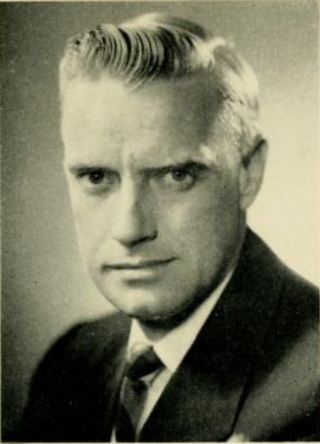
Edward Moore Kennedy was an American lawyer and politician who served as a United States senator from Massachusetts. A member of the Democratic Party and the prominent Kennedy family, he was the second-most senior member of the Senate when he died. He is ranked fifth in U.S. history for length of continuous service as a senator. Kennedy was the younger brother of President John F. Kennedy and U.S. attorney general and U.S. senator Robert F. Kennedy, and the father of U.S. representative Patrick J. Kennedy.

Endicott Howard Peabody was an American politician from Massachusetts. A Democrat, he served a single two-year term as the 62nd Governor of Massachusetts, from 1963 to 1965. His tenure is probably best known for his categorical opposition to the death penalty and for signing into law the bill establishing the University of Massachusetts Boston. After losing the 1964 Democratic gubernatorial primary, Peabody made several more failed bids for office in Massachusetts and New Hampshire, including failed campaigns for the U.S. Senate in 1966 and 1986.

John Foster Furcolo was an American lawyer, writer, and Democratic Party politician from Massachusetts. He was the state's 60th governor, and also represented the state as a member of the United States House of Representatives. He was the first Italian-American governor of the state, and an active promoter of community colleges.

The 1964 United States Senate elections were held on November 3. The 33 seats of Class 1 were contested in regular elections. Special elections were also held to fill vacancies. They coincided with the election of President Lyndon B. Johnson by an overwhelming majority, to a full term. His Democratic Party picked up a net two seats from the Republicans. As of 2023, this was the last time either party has had a two-thirds majority in the Senate, which allowed the Senate Democrats to override a veto, propose constitutional amendments, or convict and expel certain officials without any votes from Senate Republicans. However, internal divisions would have prevented the Democrats from having done so. The Senate election cycle coincided with Democratic gains in the House in the same year.

The 1962 United States Senate elections was an election for the United States Senate. Held on November 6, the 34 seats of Class 3 were contested in regular elections. Special elections were also held to fill vacancies. They occurred in the middle of President John F. Kennedy's term. His Democratic Party made a net gain of four seats from the Republicans, increasing their control of the Senate to 68–32. However, this was reduced to 67–33 between the election and the next Congress, as on November 18, 1962, Democrat Dennis Chávez, who was not up for election that year, died. He was replaced on November 30, 1962, by Republican appointee Edwin L. Mechem. Additionally, Democrat Strom Thurmond became a Republican in 1964, further reducing Democrats to 66–34. This was the first time since 1932 that Democrats gained seats in this class of Senators.
The Massachusetts Democratic Party (MassDems) is the affiliate of the Democratic Party in Massachusetts. It is chaired by Steve Kerrigan and is the dominant party in the state, controlling all nine of the state's U.S. House seats, both U.S. Senate seats, all six elected statewide offices including the governorship, and supermajorities in both houses of the state legislature.

Edward Joseph McCormack Jr., was an American attorney and politician from Massachusetts. He was most notable for serving as Massachusetts Attorney General from 1959 through 1963.

The 1964 United States Senate election in Massachusetts was held on November 3, 1964, with the incumbent Democratic senator, Ted Kennedy, easily defeating his Republican challenger Howard J. Whitmore Jr.

The 1952 United States Senate election in Massachusetts was held on November 4, 1952, in which Incumbent Republican Henry Cabot Lodge Jr. lost to Congressman and future President John F. Kennedy, the Democratic Party nominee.

The 1916 United States Senate election in Massachusetts was held on November 7, 1916. Republican incumbent Henry Cabot Lodge defeated Democratic Mayor of Boston John F. Fitzgerald to win election to a fifth term.

The 1964 Massachusetts gubernatorial election was held on November 3, 1964. Incumbent Governor Endicott Peabody ran for re-election, but was defeated by then-Lieutenant Governor Francis X. Bellotti in the Democratic Party primary. Bellotti went on to lose the general election to former Governor John Volpe.

The 1960 Massachusetts gubernatorial election was held on November 8, 1960. John A. Volpe was elected Governor of Massachusetts to replace Foster Furcolo. Volpe defeated Democrat Joseph D. Ward in the race. Also running were Henning A. Blomen of the Socialist Labor Party of America and Guy S. Williams of the Prohibition Party.
The 1966 Massachusetts general election was held on November 8, 1966, throughout Massachusetts. Primary elections took place on September 13.
A Massachusetts general election was held on November 6, 1962, in the Commonwealth of Massachusetts.
A Massachusetts general election was held on November 8, 1960, in the Commonwealth of Massachusetts.

Gerard Francis Doherty was an American political figure who was a member of the Massachusetts House of Representatives from 1957 to 1965 and Chairman of the Massachusetts Democratic Party from 1962 to 1967.
A Massachusetts general election was held on November 4, 1958, in the Commonwealth of Massachusetts.
A Massachusetts general election was held on November 6, 1956, in the Commonwealth of Massachusetts.
A Massachusetts general election was held on November 4, 1952 in the Commonwealth of Massachusetts. Primary elections took place on September 16.
Francis Xavier Morrissey was a Massachusetts attorney who served as a judge on the Boston Municipal Court from 1958 to 1980. Morrissey was John F. Kennedy's secretary when Kennedy served as a congressman and senator.

















